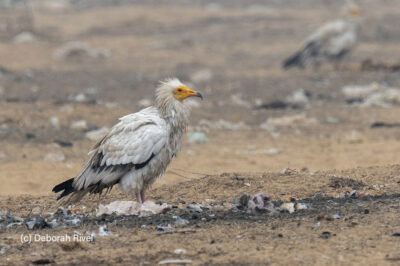
Vultures may not be the cutest or the most beautiful of birds, but they are incredibly efficient disposers of carcasses and maintainers of a healthy environment and a keystone species. A flock of 100 vultures can completely clean up a 100-pound carcass in 3 minutes. Quick clean-up means there is less chance of disease spreading from the carrion. But in India, the populations of certain vulture species have decreased by over 97% in a 15-year period. This crash of these keystone species is causing a massive change in sanitation and safety and is having unexpected and dangerous societal effects.
In India, Nepal, and some other countries, vultures are being poisoned by veterinary drugs livestock are treated with. The biggest killer is Diclofenac – a popular drug that some people use for inflammation. This drug is safe for mammals but is lethal to vultures. So when an animal dies that has been treated with diclofenac, the vultures who arrive to do their duty to clean up the carcass are poisoned and die where they landed to feed. With fewer vultures, but certainly no less cleanup needed, their specific and passive niche of carcass disposal is being replaced by increasing numbers of feral dog packs. Along with the now millions of uncontrolled feral dogs, there is not surprisingly, a steep rise in cases of rabies and associated deaths from dog bites. Likewise, dogs are inefficient replacements for vultures who meticulously clean carcasses and there is danger to water supplies that are being contaminated by leftover carrion. Diclofenac and other similar drugs have been banned for use in many countries, India included, but despite the ban, there are still stores of the drugs in use.
Vultures need to have clean, uncontaminated food to be safe, breed, and start to repopulate. To this end, Birdlife International and its India and Nepal Partners, Bombay Natural History Society and BCN Birdlife Nepal, are actively working to have all deadly veterinary drugs banned (an additional two were banned in September), and are opening safe zones where vultures are fed uncontaminated food at “Vulture Restaurants”. The goal is to have a complete ban on and to clear larger areas of these lethal drugs, so vultures can live in the wild and go about their important business of maintaining a safe environment for everyone.
For more information on what is being done to save vultures, check out this article from Birdlife International.